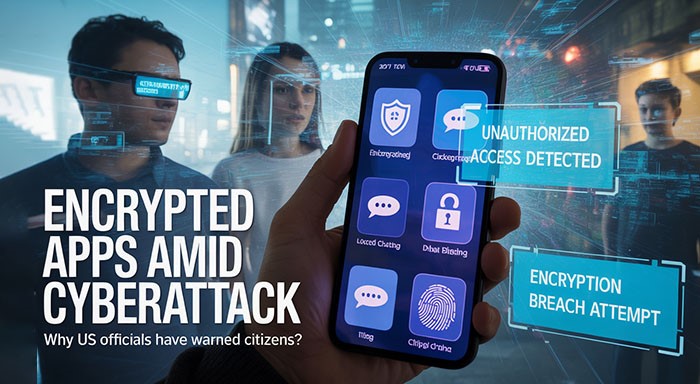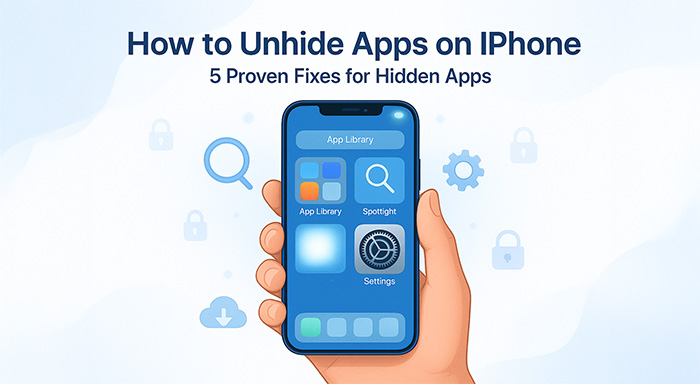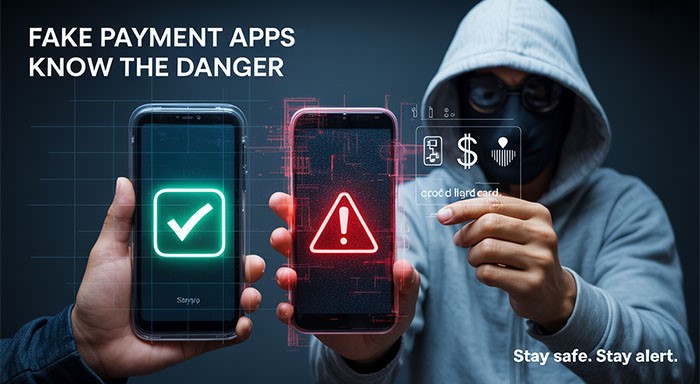As an unforeseen security alert, federal authorities are encouraging American citizens to switch to encrypted apps amid cyberattack threats. This comes in the wake of one of the most dangerous security breaches in US history. This large-scale cybersecurity threat, now referred to as Salt Typhoon, has impacted a great number of telecommunications, including Verizon, AT&T, and Lumen Technologies. As Chinese hackers proceed to access confidential communication data, federal agencies now suggest citizens to use encrypted applications to mitigate the risk of cyberattacks. These encrypted applications can serve as a major protection barrier for American citizens.
What Do We Mean by Encrypted Apps Amid Cyberattack Protection Strategy?
The overall concept of leveraging encrypted apps amid cyberattack scenarios showcase a foundational shift in how Americans approach online communication security. This strategy pertains to transitioning from conventional calling and messaging services to applications that render end-to-end encryption. This makes intercepted communications unreadable and meaningless to foreign adversaries.
Federal experts in cybersecurity define this comprehensive approach as adopting messaging applications that encrypt communications between users automatically. This makes sure that even if hackers manage to gain access to data during transmission, the actual message remains unreadable and protected. The incident of Salt Typhoon incident has exemplified why encrypted apps amid cyberattack threats have become greatly relevant for US national security.
The main components of this overall protection strategy involve:
- End-to-end encrypted messaging solutions such as WhatsApp and Signal.
- Encrypted tools for sensitive calls and safe voice communication.
- Safe device management with automatic updates of security.
- Multi-factor authentication for all accounts used for communication.
Impact of Salt Typhoon Cyberattack on American Communications
The Salt Typhoon cyber-attack campaign showcases the advanced attack on the overall infrastructure of US telecommunications in recent times. Foreign hackers gained access to numerous major carriers, access three most important types of communication that showcase why encrypted apps amid cyberattack situations are now more vital.
Reach of This Telecommunications Breach
Call Metadata Compromise: The hackers mainly target metadata and call records, revealing communication details of millions of American citizens. This involves:
• Contact details of associates, colleagues, family and friends
• Duration and timing of all kinds of communications.
• Location data from areas in proximity to Washington D.C.
• Patterns of communication frequency for intelligent analysis.
Interception of Live Communication: More concerning is the ability of hackers to understand real-time interactions of high-profile targets. For example, hackers might be interested in learning about the communication details of President Donald Trump, Former Vice President Kamala Harris, and New York Senator Chuck Schumer. This capability showcases why federal officials now suggest encrypted apps amid cyberattack threats for confidential communications.
Law Enforcement System Access: The cyberattack was potent enough to compromise CALEA systems. These systems are Communication Assistance for Law Enforcement Act, i.e., systems utilized for legal surveillance processes. The breach revealed access to:
- Court-ordered surveillance processes
- Processes for gathering data.
- Confidential communications with law enforcement.
- Investigation details for national security.
Federal Suggestions for the Use of Encrypted Apps Amid Cyberattack Threats
Responding to the present security problems, CISA and FBI are making unforeseen suggestions to ensure robust civilian cybersecurity practices. Jeff Greene, who is an executive assistant director for cybersecurity at CISA, emphasized on the need of the Americans to trust encrypted apps amid cyberattack situations to safeguard their communications.
Official Guidelines for Encryption
Recommended Applications for Encrypted Messaging: American authorities majorly endorse numerous messaging platforms that ensure end-to-end encryption:
- Signal provides military-level end-to-end encryption for calls and messages.
- WhatsApp ensures automatic encryption for voice communications and text messages.
- iMessage ensures automatic encryption between numerous Apple devices.
- Google Messages ensures RCS encryption for various Android users.
Improved Measures for Device Security: Apart from messaging applications, officials suggest complete security practices:
- Utilize smartphones with automatic updates for operating systems.
- Execute multi-factor authentication on all types of accounts.
- Leverage devices with professional-grade systems for encryption management.
- Prevent clicking on suspicious links in emails and messages.
Why Is Encryption So Important?
Encryption is your biggest asset irrespective of whether it is text messages or voice communication. Even if cyber attackers become successful in intercepting your data, if the encryption is successful, it will make it impossible for the hackers to gain accessibility to actual message content.
This showcases a major shift in policy, as agencies of law enforcement have traditionally been hesitant to adopt encryption. However, the Salt Typhoon attack has demonstrated that encrypted apps amid cyberattack situations provide the only dependable protection against advanced state-sponsored hacking processes.
Impact on Individual Privacy and National Security
The Salt Typhoon cyberattack has revealed major vulnerabilities in the telecommunications infrastructure of the US that go beyond specific privacy concerns of the user. The breach showcases systematic weaknesses in how confidential communications are safeguarded, ensuring encrypted apps amid cyberattack situations become a national security imperative.
Consistent Challenges of Security
Incomplete Attack Remediation: The attack has demonstrated that advanced attackers do have the capability to infiltrate even the most secure US telecommunication systems. Moreover, rectifying the situations takes time and the onus falls on the individual users to protect their data. Thus, continuous use of encrypted apps during cyberattacks is hugely important.
Vulnerabilities of CALEA System: The attack has raised significant questions related to the overall security of the systems that enable law enforcement to track communications under the court order. Privacy advocates such as Senator Ron Wyden have greatly criticized the dependency on these possible vulnerability platforms. And cyber experts also believe that any system which holds sensitive data can become a target of cyberattacks.
Global Implications and Scope: As far as cyberattacks are concerned, no country or individual user is safe. Apart from US telecommunications, numerous other institutions have become victims of cyberattacks. This indicates the worldwide threat of cyberattacks. The extensive global implications showcase why encrypted apps amid cyberattack threats have become a global concern needing instant action.
Lasting Considerations of Privacy
The Salt Typhoon incident has caused foundational changes to how US citizens think and approach online communication privacy. With federal agencies working hard to ensure impregnable security of US telecommunication systems, individual users must also do their part to make sure their online communication remains secure with encryption technology.
Safeguarding Your Online Communication with Encrypted Apps Amid Cyberattack Threats
It is advisable to go beyond relying on federal agencies for comprehensive online security. US citizens must also adopt strong measures to safeguard their communications. Executing encrypted apps amid cyberattack protection strategies renders robust safety against ever-present cyberthreats.
Instantaneous Security Actions
Transition to Encrypted Platforms for Communication:
• Download and setup WhatsApp or Signal for all routine communications.
• Allow features of encryption in the present messaging applications.
• Leverage encrypted voice calling systems for confidential interactions.
Complete Protection of Devices:
• Setup automatic software upgrades on all functioning communication platforms.
• Utilize robust and unique passwords with enhanced multi-factor authentication.
• Consistently update and review settings on all kinds of applications.
• Consider adopting reliable devices, recognized for their powerful encryption capabilities.
Best Practices of Communication:
- Work with the assumption that no non-encrypted devices or communications are safe and can be attacked by foreign attackers.
- Utilize encrypted systems for confidential personal or business communications.
- Implement caution when dealing with personal details over unreliable phone calls.
- Assess sensitivity of information before selecting a communication method.
Sophisticated Measures of Security
For individual users managing confidential information with ease, additional security steps might be important beyond standard encrypted apps amid cyberattack protection:
• Leverage burner phones for highly sensitive interactions.
• Execute VPN services for more network security layers.
• Consider leveraging safe email services providing end-to-end encryption.
• Consistently audit and update all practices related to digital security.
Conclusion
The Salt Typhoon cyberattack is a great learning experience for both government and individual users. This showcases why encrypted apps amid cyberattack situations have become important for safeguarding personal data and interactions. With foreign adversaries being successful in infiltrating major telecommunication, encryption technology can play a great role in thwarting such attacks in future.
The unforeseen suggestions from these federal agencies to adopt encryption for routine civilian use cases underlines the importance of the present threat landscape. As authorities continue to safeguard telecommunications infrastructure, individual US citizens cannot just solely depend on government safety. Integrating encrypted apps during cyberattack ensures fundamental protection. Even if hackers intercept messages, encryption will make sure messages remain unreadable.








